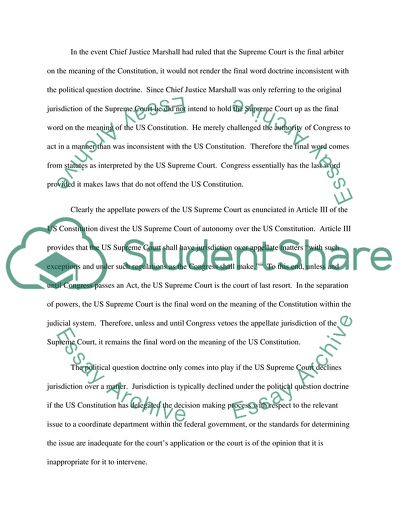
- Home
- Free Samples
- Premium Essays
- Editing Services
- Extra Tools
- Essay Writing Help
- About Us
- Studentshare
- Subjects
- Miscellaneous
- Constitutional Law
Constitutional Law - Essay Example

- Subject: Miscellaneous
- Type: Essay
- Level: Masters
- Pages: 4 (1000 words)
- Downloads: 0
- Author: carmen44
Extract of sample "Constitutional Law"
commission was unconstitutional.i Chief Justice Marshall ruled that the Act according the Supreme Court with the power of commission conflicted with Article III of the Constitution which establishes the limited original jurisdiction and appellate jurisdiction of the Supreme Court.ii In providing his ruling, Chief Justice Marshall stated that congress could not modify the original jurisdiction of the Supreme Court which by virtue of Article II of the Constitution did not provide for the commission of chief justices.
In this regard, Chief Justice Marshal was not stating that the judiciary had the final say with respect to its own powers. He was merely giving voice to the supremacy of the Constitution. The Constitution has the final say on the power of the court. If an act of Congress is inconsistent with the Constitution it is null and void. It therefore follows that Chief Justice Marshall was commenting on the broader concept that the Supreme Court had the authority to rule on the constitutionality of the acts of other coordinate departments.
In the event Chief Justice Marshall had ruled that the Supreme Court is the final arbiter on the meaning of the Constitution, it would not render the final word doctrine inconsistent with the political question doctrine. Since Chief Justice Marshall was only referring to the original jurisdiction of the Supreme Court he did not intend to hold the Supreme Court up as the final word on the meaning of the US Constitution. He merely challenged the authority of Congress to act in a manner than was inconsistent with the US Constitution.
Therefore the final word comes from statutes as interpreted by the US Supreme Court. Congress essentially has the last word provided it makes laws that do not offend the US Constitution. Clearly the appellate powers of the US Supreme Court as enunciated in Article III of the US Constitution divest the US Supreme Court of autonomy over the US Constitution. Article III provides that the US
...Download file to see next pages Read More
- TERMS & CONDITIONS
- PRIVACY POLICY
- COOKIES POLICY